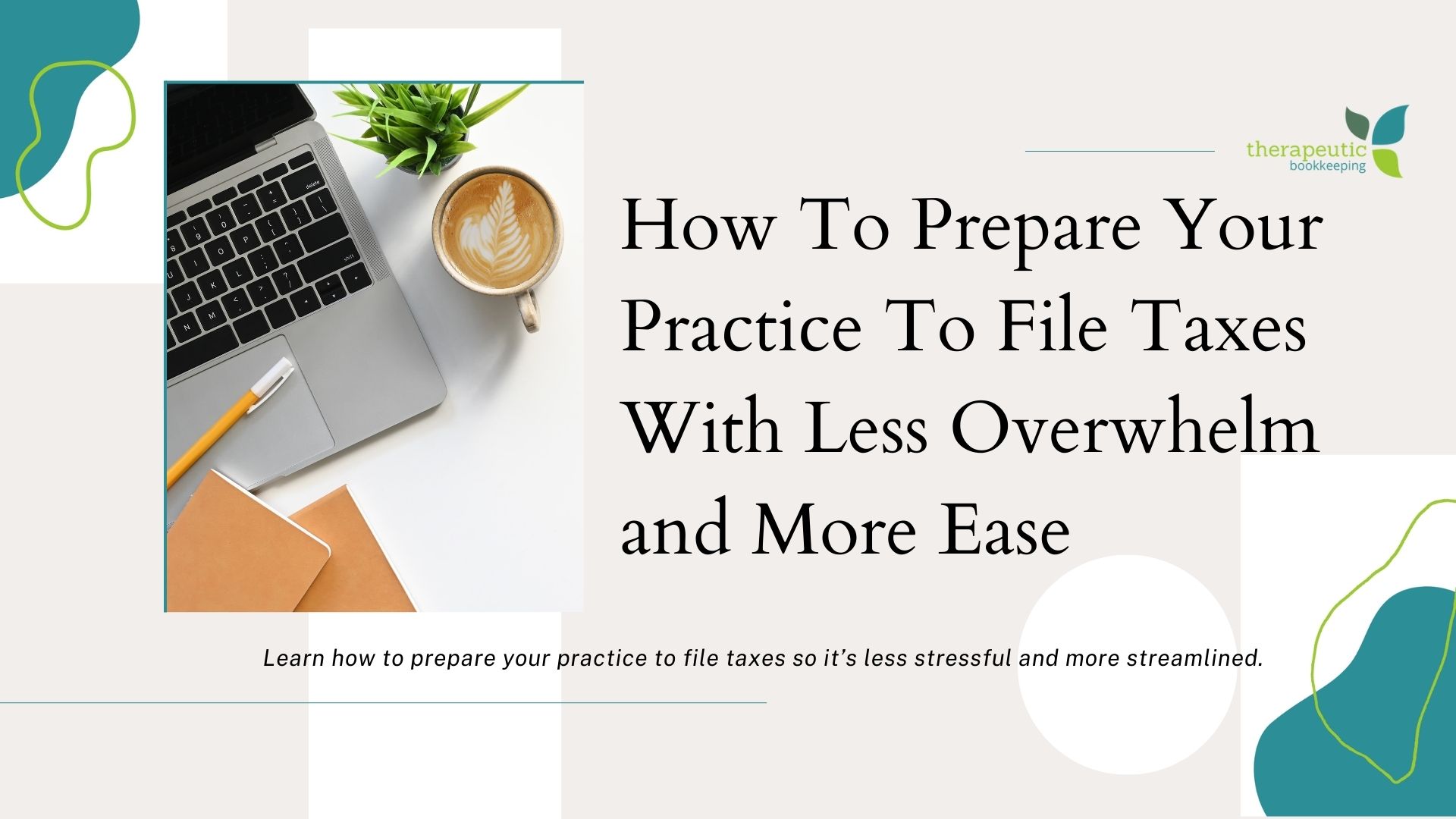
How To Prepare Your Practice To File Taxes With Less Overwhelm and More Ease
It’s everyone’s favorite topic… taxes! For most business owners, this is a stressful and overwhelming time. But it doesn’t have to be! With the proper planning, filing your taxes can be a total breeze. 😎
The more prepared you are to file your taxes, the easier it’ll be on both you AND your tax preparer. It’s all about helping them understand how your business ran the previous year, so you get the maximum deductions and pay the least possible amount in taxes!
In this blog, we’re covering how to get your practice prepared by doing things like:
- Organizing your financial records
- Gathering necessary tax forms
- Evaluating potential deductions and credits
- Considering estimated tax payments
- Seeking professional advice
You might not be able to completely avoid the stress of tax season, but by following this handful of tips every year, you can definitely eliminate some of the headache!
Organize your financial records
When it comes time to prepare your taxes, you’ll need to have all of your financial records organized, up-to-date, and easily accessible. This includes not only your income and expense records, but information on all the types of deductions and credits you may be eligible for.
You’ll need to collect records for the past year, such as tax forms, business transactions, investments, and other documents. It’s a good idea to create a digital filing system that keeps your personal and business expenses separate (SUPER important not to mingle those two!).
Accounting software is SO helpful when you’re a busy business owner, too. Something like QuickBooks Online is a great solution for those who still want to do their own bookkeeping OR want to outsource it to a professional at some point.
If you’re behind on bookkeeping, it’s always a good idea to have a pro help you get caught up so you’re ready to roll when taxes are due (psst… This is kind of our thing, we’d love to meet and see how we can support you!).
How you structure your practice can make a big difference when it comes to taxes. According to the Small Business Administration, sole proprietors and partners in a partnership should record income and expenses on an annual basis. Limited liability companies (LLCs) and corporations will have to file taxes each quarter. Make sure you have the appropriate records in order so that filing is simple and organized.
Wondering if your practice should be an S Corporation or an LLC? Read: How To Know When It’s Time To Become an S Corp.
Gather necessary tax forms and information
Before you start filing your taxes, you’ll need to collect all of the necessary documents, forms, and information. Gather any relevant forms related to filing your taxes, such as W-2s, 1099s, income statements, expense reports, and any other business-related records or transactions.
If you are unsure what documents to collect or want to know more about your deductions and credits, get in touch with a tax professional (aka your favorites here at Therapeutic Bookkeeping)!
Here’s a handy tax form checklist for reference for a few of the most common documents you will need to have ready for tax preparation:
- W-2s
- 1099s
- Income statements
- Expense reports
- Balance Sheet
Evaluate potential deductions and credits
It’s also SUPER important that you understand the potential deductions and credits you may be eligible for. Deductions reduce your taxable income, while credits reduce the amount of taxes you owe.
Deductions can include expenses related to a business, such as office supplies, travel, and home office deductions.
A few common deductions for therapists include:
- Therapy Session Supplies
- Supervision costs
- Continuing education, training, and networking events
- Tech subscriptions and internet
- Office rent/utilities
- Insurance
- Professional services (bookkeeping pro, lawyers, etc.)
- Marketing expenses
- Office supplies
Keep in mind that tax laws change from time to time and you may be eligible for additional deductions or credits. Make sure to research new tax laws and speak with a tax professional to make sure you are taking full advantage of all the deductions and credits you may be eligible for.
Consider estimated tax payments
LLCs are typically required to pay estimated taxes each quarter. Estimated taxes may be paid when the due date for taxes approaches, but it’s a good idea to start saving for taxes early.
Depositing a set amount into a separate bank account designated for taxes throughout the year can help ensure you are prepared to make estimated payments when the time comes. If you’re not sure how much your estimated tax payments to federal and state should be each quarter, use last year’s tax liability as a reference. But we highly recommend you work with a tax professional to estimate these amounts for you each quarter using the actual income you made each quarter in your business and total household income. At Therapeutic Bookkeeping we offer our bookkeeping clients the add-on of Quarterly Tax Estimates and it’s our most popular add-on service as well as hugely beneficial to ensuring our clients avoid a large, surprise tax amount due come tax time! 💪
Keep in mind that failure to make estimated payments may result in a penalty, so plan ahead and save. Once you have a good estimate of what you’ll be paying in taxes, setting up automatic transfers between bank accounts is a great way to make sure you’re prepared when it comes time to pay.
Seek professional advice
Preparing your taxes can be complicated, especially if this is your first time filing for your practice. To make sure you’re filing correctly and taking full advantage of all available deductions and credits, lean on a tax professional. A tax pro can help you understand the latest tax laws, ensure that you are in compliance with IRS regulations, and properly file your taxes.
Basically, we make the whole process a hell of a lot simpler than if you were to DIY 😉
Being fully educated on the current tax code will help minimize your tax bill and protect you from any ‘consequences’ for filing incorrectly. Even if you prefer to file your taxes on your own, it’s always a good idea to consult with a tax advisor to double-check that everything’s in order before filing your taxes.
With a little preparation and planning, filing taxes for your practice can be (mostly) painless. Be sure to organize your financial documents, gather necessary forms, evaluate deductions and credits, make estimated payments, and consider seeking professional advice.
Following these steps will ensure that your practice is prepared and your taxes are filed on time and accurately. Make sure to give yourself *plenty* of time to file if you don’t want to pay late fees!
If you’re ready to work with a tax professional for filing your business and individual taxes and who understands your business and industry, we’d love to have you apply to work with us HERE!








